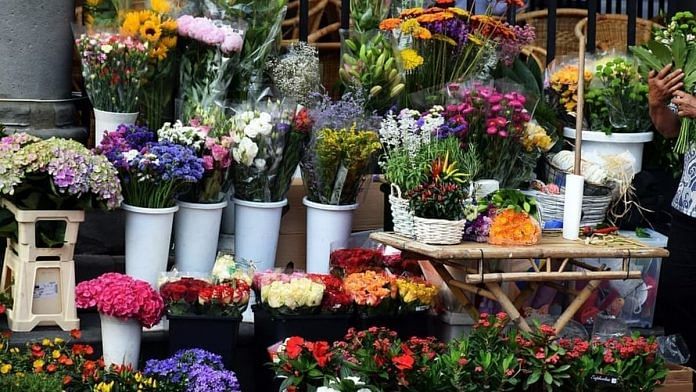New Delhi: Floriculturists across the country are reeling under the effects of a near-complete halt in weddings, religious ceremonies and events in India since 25 March, when the nationwide lockdown to curb the spread of Covid-19 was imposed.
Flowers being a luxury item, their demand has crashed both domestically and abroad, hitting exports.
Staring at a business loss for at least the next two-three years due to poor outlook for public events and gatherings amid public health fears, many are now even considering a shift to conventional farming of fruits and vegetables.
Ramesh Kumar, a floriculturist who cultivates roses on the Yamuna river bank in the Arail village of Uttar Pradesh’s Prayagraj, said the April-June wedding season and festivals, corporate events and other banquet events in summer holidays are crucial for his business.
“But the lockdown and restrictions have destroyed businesses like us that have to make money daily with flowers, which are a highly perishable commodity,” said Kumar, who has been cultivating on an 11-acre farm for eight years.
Apprehensive about the future prospects, he said even if the lockdown gets lifted there will be no auspicious occasions as there are fears in people now to celebrate anything in gatherings due to Covid-19. “The two months of the lockdown has already resulted in a loss of Rs 28 lakh till now,” he added.
Hit to sector
The Covid-19 lockdown across the country has devastated not only flower farmers but also the multiple stakeholders in the business chain. Due to closure of flower markets, thousands of retail flower bouquet sellers and traders have suffered over the last two months.
The trade of flower cultivation is unlike other vegetables, food and foodgrain cultivation as most of the produce is not sold in agricultural produce market committee markets. Most of the floriculture produce is sold to wholesale traders directly at flower farms and nurseries across the country. However, this has adversely affected the flower business.
Under the lockdown, the movement of agriculture produce like fruits and vegetables is permitted as an exception under essential commodities but the movement and trade of flower business has almost halted.
“A week after the lockdown, we were forced to throw flowers as waste as they started rotting in the storage. These were meant to be offered to gods in temples at their altar but stray animals fed on them on roads,” said Dhamang Rao. He owns a flower business in Maharashtra’s Yavatmal and trades in marigolds, jasmine, chrysanthemums, lilies, roses and water lilies.
“All of the flower farmers who used to supply me had to feed it to their livestock and cows as even their fellow villagers are purchasing flowers from them as cheap cattle feed. The only source of flower farmers’ livelihood has been completely destroyed,” said Rao.
“Everyone is losing their jobs as all the businesses have shut down so the people are struggling even to buy their food and vegetables so who will buy flowers now. There is no function, no celebration anywhere for us to do business,” he said, adding that he is facing a loss of up to Rs 8 lakh per month.
Also read: Delhi to Chennai, wholesale vegetable mandis are turning into festering Covid hotspots
Dip in global demand too
It’s not just the shutdown of domestic flower trade that has had a severe impact on floriculturists. The fall in global demand and exports has also proved a setback for the industry.
Flower exporter Vishnu Khode, who owns Satav Pushpa Bhandar and Aadatdar in Pune, said, “The export of flowers has completely stopped now.” Khodse exports flowers to the US and Europe.
“Indian roses grown in Bengaluru and Pune along with Goan orchids have the biggest demand in Europe and the United Kingdom. The flowers exported from Maharashtra alone are worth around Rs 100 crore, which has completely stopped now. Plus there is loss of lakhs for farmers for domestic consumption,” he said.
“Along with flowers, we also export five to 10 lakh stems of flowers every week,” added Khode.
According to the Agricultural and Processed Food Products Export Development Authority, India exported 19,726.57 metric tonnes of floriculture products worth Rs 571.38 crore in 2018-19. The US, the Netherlands, the UK, Germany and the UAE are major importers of Indian floriculture products.
A possible shift?
The immense loss for floriculturists across the country since Covid lockdown has left them to look around for other means of farming to ensure their survival. But with investment worth lakhs being already made for flower cultivation the farmers are left with little choice but to diversify, leading them to cultivate few selected vegetables and fruits.
Nandu Singh, a farmer in Sitapur, Uttar Pradesh, said, “I’ve already invested Rs 25 lakh into building a polyhouse and greenhouse for cultivating gerbera, rose and lily which I can’t just do away with.”
He said, “I can only grow muskmelon and capsicum in these polyhouses which are also selling for a low price of only Rs 10-20/kg. But at least I will earn something rather than nothing by still cultivating these flowers.”
Experts agree too that with business prospects looking bleak for floriculturists due to the pandemic, they must better shift to cultivate fruits and vegetables for survival.
“The silver lining for flower farmers to switch over to fruit and vegetable farming is that post Covid-19, more and more people will consume fruits and vegetables to improve their immunity and this will give farmers decent profits,” said Arabinda Kumar Padhee, director of country relations and business affairs, International Crops Research Institute for the Semi-Arid Tropics, Hyderabad.
“Flower farmers also have an entrepreneurial advantage as they improvise for supply chain and take the risk in cultivating new crops so they can adjust to cultivate fruits and vegetables as per the local demands,” added Padhee.
Also read: Surat diamond industry has lost Rs 30,000 crore, but it’s in no rush to restart business



